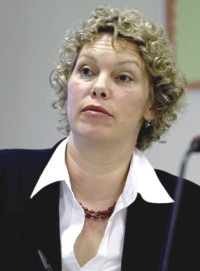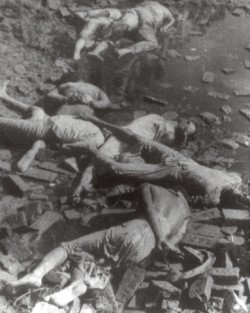|
Human Rights
Ensuring Justice
Laurel E Fletcher, Clinical Visiting Professor of Law at the Yale Law School talks about her experience and understanding of the war crimes and the challenges faced by war crime tribunals
Tamanna Khan
 |
Laurel E Fletcher
Photo: Rashed Shumon |
The twentieth and the twenty-first centuries have witnessed the most widely proliferated conflicts in human history - the two World Wars, systematic and planned murders of entire communities and the emergence of sexual violence against women not only as weapon of war but also as a tool of “ethnic cleansing”.
Fortunately, human conscience has led the international community to statue laws to deal with human rights violation irrespective of the circumstances under which those are committed and where they are committed. As a result we have seen the emergence of Universal Declaration of Human Rights (UDHR) and the Convention on the Prevention and Punishment of Crime of Genocide in 1948. Later on the establishment of International Criminal Court in 1998 that can investigate and try individuals for the most serious international crimes like genocide, crimes against humanity and war crimes, has ultimately given mankind a strong foothold through which they can hope to ensure justice and reconciliation in societies that suffered from incidence of atrocities.
In Bangladesh, after almost four decades, the war crimes perpetrated in 1971 against the Bengali population is ultimately set out for trials at the national level under the International Crime (Tribunals) Act, 1973. However, the national court holds the responsibility of carrying out a transparent and fair trial to uphold the judicial system of the country to the international community. Legal experts across the world are particularly keen about the trials since yet another nation has taken up the task of ending the impunity for perpetrators of heinous war crimes, which according to the Statue of the International Criminal Court, is the moral obligation of every state.
Laurel E Fletcher, Clinical Visiting Professor of Law at the Yale Law School has recently visited Bangladesh to share her expertise on international criminal law on sexual violence and how it is accounted for under the International Crime Tribunal, at a workshop held at the Liberation War Museum. Fletcher is active in the area of humanitarian law and transitional justice, which she defines as a field of study that has emerged over the last twenty years, looking at the way in which societies try to account for a criminal episode of mass human rights violations and war crimes, which may either had been carried out in conflicts or under an authoritarian regime. Because of her interest in the area she has advocated for human rights victims before international human rights and criminal tribunals. While visiting Bangladesh, Fletcher talks about her experience and understanding of the war crimes and the challenges faced by such tribunals.
One of the main challenges faced by any war crimes tribunal is evidence that proves the crimes were systematic and planned. Fletcher emphasises that investigators should look for a pattern of the crime being carried out. “If you have evidence that a large number of incidents were happening all over the country it is very difficult to show that, that (the criminal act) was just random. The patterns suggest that this was intentional and that had to be organised,” she says. Highlighting the Rwandan experience she explains how prosecutors showed that the genocide was organised. Right before the genocide took place, she informs, the importation of machetes the knives that were mostly used in the killing- had gone up to an abnormal level, a number that did not rationalise its use in the Rwandan agrarian society.
 |
It is the duty of every state to exercise its criminal jurisdiction
over those responsible for heinous international crimes like
genocide, crimes against humanity and war crimes. Photo: Star File |
According to Fletcher, direct evidence by eye-witnesses, people who say 'I saw this' or 'this happened to me', is very difficult to imply the presence of a wide spread pattern. She rather suggests that prosecutors should look for evidence of orders and policy that implies that political or military leaders had sat down and planned an attack. This can be either in the form of documentary evidence or testimonial evidence from someone who witnessed such meetings. She also talks about archival evidence that can be in the form of reports by academicians who have studied the war or newspaper reports that covered the war or had published interviews of commanders of either the perpetrators or the rebels. Journalists who had taken interviews of such people at the time of the atrocities can also provide evidence. “Another source of evidence is if you can find unit commanders and they provide evidence that 'these were my orders and so this is what I carried out'. These can be used to show that the crimes carried out were widespread and systematic,” opines Fletcher.
Reflecting on sexual violence, Fletcher agrees that the inhibitions in conservative societies like ours in prosecuting such crimes create a huge obstacle. “In all of the conflicts there has been sexual violence and all of the tribunals face challenges to have victims and witnesses come forward and testify. You need strong victims and witness support so that witnesses and victims feel comfortable and protected in order to come forward. In those tribunals there are measures that the court can take to protect the identity of the victims from being disclosed publicly, they can provide measures to protect the security of victims and witnesses,” she says. However she believes that conducting prosecution of crimes of sexual violence is not impossible, as successful prosecutions have taken place in Yugoslavia, Rwanda and the Sierra Leone.
According to Fletcher's research on countries that have used transitional justice, the rule of law is very central to national war crimes tribunals. Her study shows that communities that did not have confidence in domestic courts would prefer international courts to provide a fair trial for justice. She gives the example of South Africa, where there was a fairly strong rule of law even under the Apartheid regime. “The courts were seen as independent and capable of delivering justice within the limits of the Apartheid regime. In comparison, Sierra Leone had a very weak rule of law and hybrid tribunal, meaning that it was an agreement between the government of Sierra Leone and the United Nations and there was a combinations of international judges and domestic judges,” she states. She also gives the example of Guatemala that has a weak rule of law but constructed a UN sponsored truth commission that issued a report and continued with its other transitional justice measures.
To ensure the transparency and international acceptance of the war crime tribunals that are about to take place in Bangladesh, Fletcher observes that two components should be ensured. Firstly, the laws and the regulations should conform with human rights standards so that the trial is fair and secondly the trials should be conducted effectively such that the convictions are seen to be legitimate so that society and victims feel that justice has been done.
While the present government has taken up the task of putting an end to the impunity for the perpetrators of the 1971 war, the path ahead is not easy. Nations that have used different mechanisms of transitional justice had to go through a long and complex process either in formulating laws or implementing the procedures of the prosecution. Similarly, the case for Bangladesh will be no different, thus our duty as citizens who are awaiting justice for the last forty years should be to keep our perseverance and not give up hope.
Copyright
(R) thedailystar.net 2010 |
